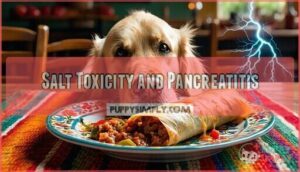This site is supported by our readers. We may earn a commission, at no cost to you, if you purchase through links.

These holiday favorites can cause serious health problems for your furry friend, from stomach upset to life-threatening anemia.
The corn husks also pose choking hazards and can block your dog’s intestines if swallowed.
Even the masa dough contains high amounts of fat and sodium that can trigger pancreatitis. If your pup snatches a tamale from the table, watch for vomiting, diarrhea, or lethargy and call your vet immediately.
Understanding which specific ingredients make tamales so risky can help you keep your dog safe during celebrations.
Table Of Contents
- Key Takeaways
- Tamales and Dog Health
- Can Dogs Eat Tamales
- Tamale Ingredients and Dogs
- Health Risks of Tamales for Dogs
- Safe Alternatives to Tamales
- What to Do if Your Dog Eats Tamales
- Keeping Dogs Safe From Tamales
- Frequently Asked Questions (FAQs)
- Can dogs eat tamales?
- Can dogs eat watermelon?
- Can dogs eat raw pineapple?
- Can dogs have a tamale?
- What to do if your dog eats a tamale?
- Can Mexican dogs eat spicy food?
- Is it safe to eat tamale?
- Is it safe for dogs to eat tamales?
- Are tamales made with ingredients that are toxic to dogs?
- Is the masa in tamales safe for dogs to consume?
- Conclusion
Key Takeaways
- You shouldn’t feed your dog tamales because they contain toxic ingredients like onions and garlic that destroy red blood cells and cause anemia, plus spices that trigger stomach upset and vomiting.
- Corn husks create serious choking hazards and can block your dog’s intestines if swallowed, while the high-fat masa dough can trigger dangerous pancreatitis in your pet.
- If your dog eats a tamale, watch for symptoms like vomiting, diarrhea, lethargy, or pale gums and contact your vet immediately since these ingredients can cause life-threatening complications.
- You can keep your dog safe by storing tamales in secure containers out of reach, educating family and guests about the dangers, and offering dog-safe alternatives like sweet potatoes or plain cooked chicken instead.
Tamales and Dog Health
When you’re enjoying tamales during the holidays, your dog’s hopeful eyes might make you wonder if sharing is safe.
Unfortunately, tamales contain several ingredients that can seriously harm your pet, from toxic spices like onions and garlic to corn husks that pose choking risks.
Unfortunately, those festive tamales hiding in your kitchen pack dangerous ingredients that could seriously harm your beloved pup.
Toxic Ingredients in Tamales
Your favorite holiday treats hide dangerous secrets that could harm your furry friend.
Tamales contain several toxic tamale ingredients that pose serious risks to dogs through pet poisoning.
Here are four major toxic ingredients lurking in tamales:
- Onion Toxicity – Even small amounts cause red blood cell damage and anemia
- Garlic Dangers – More concentrated than onions, leading to severe poisoning symptoms
- Spice Irritation – Bay leaf and paprika trigger stomach upset and digestive problems
- Masa Concerns – High salt content creates toxicity risks
Symptoms of Tamale Consumption
When your dog sneaks a tamale, watch for telltale vomiting signs and diarrhea risks within hours.
These toxic ingredients trigger immediate gastrointestinal upset, causing dog vomiting and dog diarrhea.
You’ll notice lethargy causes from digestive upset, plus potential allergic reactions like itching or swelling.
Dog sickness from tamales isn’t subtle—your pup will show obvious distress signals quickly, indicating gastrointestinal upset.
Nutritional Value of Tamales
Understanding tamales’ nutritional profile helps explain why they’re problematic for your furry friend.
These traditional treats pack serious caloric density – one tamale contains 250-305 calories from high-fat content and refined carbohydrates.
Here’s what’s hiding in that tempting package:
- Macronutrient Breakdown: 47% fat, 36% carbs, 17% protein – completely unbalanced for dogs
- Mineral Composition: Excessive sodium levels that can poison your pet
- Fiber Content: Minimal nutritional benefits despite 285 calories per serving
- Vitamin Content: Overshadowed by toxic ingredients like garlic and onions
The details provided highlight the potential risks associated with feeding tamales to dogs, emphasizing the importance of understanding the nutritional content to make informed decisions about their diet.
Can Dogs Eat Tamales
The short answer is no, dogs can’t safely eat tamales due to toxic ingredients like onions and garlic that can damage their red blood cells.
While your pup might give you those irresistible puppy eyes during your tamale feast, these traditional treats pack serious health risks including choking hazards from corn husks and digestive problems from high salt content, which are significant concerns for your dog’s well-being, particularly the toxic ingredients.
Onion and Garlic Poisoning
Onions and garlic pack a serious punch regarding onion poisoning and garlic poisoning in dogs.
Onions and garlic aren’t just flavor enhancers—they’re silent killers lurking in your dog’s favorite holiday treats.
These Allium species poisoning culprits contain N-Propyl Disulphide, which destroys red blood cells and creates Anemia Risk**.
The Toxic Dosage starts at just 2 grams per pound of your dog’s weight, making even small amounts dangerous.
| Toxic Ingredients | Health Impact |
|---|---|
| Onions (fresh/powder) | Hemolytic anemia, weakness |
| Garlic (5x more toxic) | Red blood cell destruction |
| Breed Sensitivity | Small dogs at higher risk |
| Immediate Actions | Stop feeding, contact vet |
| Long-term Effects | Organ damage possible |
Choking and Gastrointestinal Blockage
Beyond toxicity concerns, tamales present serious physical dangers. The corn husk wrapper creates a choking hazard and potential gastrointestinal blockage. Unlike dietary fiber your dog’s system can process, these husks don’t break down.
Watch for these blockage symptoms:
- Repeated vomiting without food coming up
- Loss of appetite lasting over 24 hours
- Straining during bowel movements
- Restlessness and abdominal discomfort
Intestinal blockage often requires surgical intervention, making preventative measures your best defense against suffocation risks.
High Calorie and Fat Content
Each tamale packs a calorie punch that’ll knock your dog’s diet off track.
These treats contain dangerous levels of fat and empty calories that trigger obesity risks and pancreatitis threats in dogs.
| Tamale Type | Calories | Fat Content |
|---|---|---|
| Beef | 250 | 13g |
| Pork | 250 | 15g |
| Cheese | 270 | 18g |
| Chicken | 210 | 10g |
| Canned | 230 | 12g |
Without proper portion control, tamales for dogs create calorie overload situations.
The high-fat content disrupts weight management plans, leading to serious dog health complications including weight gain.
Tamale Ingredients and Dogs
Tamales might seem harmless, but their ingredients can spell trouble for your dog.
From spicy seasonings to toxic vegetables like onions and garlic, it’s important to know what’s inside, including toxic vegetables.
Masa and Dog Digestion
Masa dough, made from corn masa, isn’t exactly easy on a dog’s stomach.
Its starchy nature and low fiber content can upset the canine digestive system, leading to discomfort.
Dogs lack the digestive enzymes needed to break it down efficiently, and gut bacteria might struggle too.
- Starch overload can cause bloating or diarrhea.
- Fiber deficiency hampers digestion.
- Sticky dough strains your dog’s gut.
Spices and Seasonings in Tamales
Spices in tamales, like chili powder, cumin, and chili peppers, aren’t dog-friendly.
These can irritate your pup’s stomach, leading to vomiting or diarrhea. Even small amounts of onion or garlic in seasonings can harm their red blood cells.
| Spice | Effect on Dogs |
|---|---|
| Chili Powder | Vomiting, diarrhea |
| Cumin | Stomach irritation |
| Garlic | Anemia risk |
| Onions | Red blood cell damage |
| Chili Peppers | Stomach cramps, vomiting |
The listed spices, including garlic and chili peppers, pose specific risks to dogs, as outlined in the table, highlighting the importance of avoiding these ingredients in dog food.
Bay Leaf and Paprika Toxicity
Bay leaf risks and paprika irritation make tamale ingredients unsafe for dogs.
While bay leaves can block intestines or cause GI upset, paprika’s spice sensitivity often leads to vomiting or diarrhea.
These toxic effects highlight the dangers of tamales for pets, emphasizing the need to stick to safe spices like parsley or basil, and always double-check ingredients to prevent tamale poisoning in dogs.
Health Risks of Tamales for Dogs
Feeding your dog tamales might seem harmless, but it can lead to a range of health problems.
From toxic ingredients like onions and garlic to choking hazards from corn husks, tamales can put your dog’s health at serious risk.
Hemolytic Anemia and Onion Consumption
Onions may seem harmless, but their N-Propyl Disulphide—a sneaky sulfur compound—attacks your dog’s red blood cells, leading to hemolytic anemia.
Watch for these anemia symptoms:
- Pale gums or lethargy.
- Vomiting or reddish urine.
- Weakness or collapsing.
- Loss of appetite.
Even small onion doses are toxic. Keep your pup away from anything onion-related!
Garlic Toxicity and Dog Health
Garlic in tamales isn’t just a spice—it’s a recipe for trouble.
Toxic to all dogs, especially sensitive breeds, garlic poisoning can cause anemia by damaging red blood cells. Whether fresh, powdered, or cooked, allium family ingredients pose dog health risks.
Chronic garlic exposure isn’t worth the risk. Think safe garlic alternatives instead of feeding tamale ingredients dogs can’t digest.
| Garlic Danger | For Dogs | Symptoms |
|---|---|---|
| Fresh Garlic | Highly toxic | Vomiting, diarrhea |
| Powdered Garlic | Extremely concentrated | Pale gums, weakness |
| Cooked Garlic | Still unsafe | Lethargy, jaundice |
| Anemia Risk Factors | All breeds vulnerable | Dark urine, rapid breathing |
| Safe Garlic Alternatives | Dog-safe herbs like parsley | No symptoms, safe digestion |
Salt Toxicity and Pancreatitis
Beyond garlic’s blood cell damage, tamales pack another serious punch through excessive sodium levels and fat overload.
Salt poisoning occurs when dogs consume high-sodium foods, causing dehydration danger and neurological symptoms.
The masa’s fat content triggers pancreatitis risks, inflaming your dog’s pancreas, which is a concern due to the potential for salt toxicity and neurological symptoms.
These toxicology concerns make tamales a double threat to dog health through both salt toxicity and pancreatitis.
Safe Alternatives to Tamales
You don’t need to deprive your dog of special treats just because tamales are off-limits.
Safe alternatives like sweet potatoes, plain cooked chicken, or homemade dog treats made with peanut butter can satisfy your pup’s craving for something special without the health risks.
Dog-Safe Foods and Treats
Instead of risky tamales, you’ll find plenty of safe human food for dogs that make excellent treats.
These dog-safe foods won’t leave you wondering if you’ve made a mistake:
- Fresh fruits like apples, bananas, and blueberries offer natural sweetness
- Cooked vegetables including carrots, green beans, and sweet potatoes provide nutrients
- Plain proteins such as chicken, turkey, and eggs deliver essential amino acids
Some owners also choose dog safe fruits as treats.
Homemade Options for Dogs
Creating homemade dog food recipes offers you complete control over ingredients.
You can make safe alternatives using chicken, rice, and sweet potatoes instead of traditional tamales.
These dog-safe recipes guarantee balanced nutrition while avoiding toxic elements.
Many owners find success with pre-made dog food.
Remember portion control when serving homemade treats.
Your pup will love these healthy ingredients without risking their wellbeing or your peace of mind.
Nutritious Foods for Canine Health
When choosing nutritious foods for your dog, focus on creating a balanced diet with quality protein sources like chicken, fish, and lean beef.
Healthy fats from salmon oil support coat health, while fiber benefits come from sweet potatoes and carrots.
Consider vitamin supplements only after consulting your vet, as most homemade dog food recipes provide essential nutrients naturally, supporting a dog’s overall coat health.
What to Do if Your Dog Eats Tamales
If your dog sneaks a tamale when you’re not looking, don’t panic but act quickly to assess the situation.
Contact your veterinarian immediately if you notice symptoms like vomiting, diarrhea, or lethargy, as tamales contain ingredients that can seriously harm your pet, including causing lethargy.
Recognizing Symptoms of Tamale Consumption
When your dog sneaks a tamale, watch for telltale warning signs that spell trouble.
Vomiting signs and diarrhea indicators appear first, followed by lethargy causes from toxic ingredients.
Check for gum pallor and unusual urine color changes, which signal tamale poisoning dogs.
Gastrointestinal blockage symptoms include repeated vomiting, diarrhea, and extreme lethargy requiring immediate attention.
Seeking Veterinary Attention
When you spot emergency symptoms after tamale consumption, contact your veterinarian immediately.
Don’t wait for symptoms to worsen—treating sick dogs requires swift action.
Here’s what vet advice for dogs typically includes:
- Blood tests to check for anemia treatment needs
- X-rays for potential blockage removal procedures
- IV fluids to prevent organ damage
- Monitoring for tamale poisoning dogs complications
Veterinary costs vary, but your pet’s health comes first.
Animal poison control hotlines offer 24/7 guidance when veterinarian advice isn’t immediately available.
Preventing Future Incidents
Preventing future incidents is easy with a little planning.
Store tamales safely, educate guests on pet safety, and securely dispose of leftovers. Teach others why tamales are risky for dogs, from choking hazards to gastrointestinal blockage.
Replace tamales with treat alternatives your dog loves. Consult a veterinarian for advice if your dog ate a tamale.
| Action | Why It Helps | What To Do | Result |
|---|---|---|---|
| Safe storage | Prevents accidental access | Use sealed containers | Keeps tamales unreachable |
| Guest awareness | Educates others on risks | Share pet safety tips | Limits accidental feeding |
| Secure disposal | Avoids temptation | Use trash cans with lids | Reduces choking hazards |
| Treat alternatives | Provides safer options | Choose dog-safe goodies | Prevents ingestion risks |
Keeping Dogs Safe From Tamales
You can protect your dog from tamale-related health risks by storing these spicy treats in secure containers and teaching family members about their toxic ingredients.
Simple prevention steps like keeping tamales out of reach and choosing dog-safe alternatives will help you avoid emergency vet visits and keep your furry friend healthy, which is a key part of maintaining their overall health.
Educating Dog Owners on Tamale Toxicity
Knowledge is power in the context of protecting your furry friend from tamale dangers.
Sharing information about toxic spices and husk hazards helps create a safer community for all dogs. When you understand why tamales aren’t safe treats, you can make better choices and help other pet parents do the same.
- Share stories about garlic poisoning and onion toxicity with fellow dog owners at the park
- Post reminders on social media about gastrointestinal blockage risks from corn husks
- Ask your vet about safe treats during regular checkups to emphasize vet importance
- Create awareness about "are tamales safe for dogs" through community pet groups
- Discuss what to do if someone says "my dog ate tamale" to spread prevention knowledge
Storing Tamales Safely
Proper tamale storage protects your dog from accidental consumption and food safety hazards.
Store tamales in sealed storage containers, refrigerate for maximum three days, or freeze for longer periods. When reheating, make certain they’re piping hot to prevent spoilage.
Consider specialized food containers for preservation. Keep tamales on high shelves where curious paws can’t reach, reducing dog food risks substantially to ensure food safety.
Choosing Dog-Friendly Foods and Treats
Beyond storing tamales properly, selecting the right dog treats makes all the difference.
Choose safe alternatives like sweet potato slices or homemade dog treats made with dog-safe ingredients.
Read food labels carefully to avoid toxic additives.
Practice treat portion control – your pup’s treats shouldn’t exceed 10% of their daily calories.
Smart choices keep tails wagging safely.
Frequently Asked Questions (FAQs)
Can dogs eat tamales?
While your dog might give you those irresistible puppy eyes when you’re enjoying tamales, don’t share the wealth.
Tamales contain onions, garlic, and spices that’re toxic to dogs, causing serious health problems.
Can dogs eat watermelon?
Yes, you can give your dog watermelon.
Remove seeds and rind first.
This sweet fruit’s packed with vitamins and water, making it a cooling summer treat that’s safe and healthy for most dogs.
Can dogs eat raw pineapple?
Like discovering gold in California, you’ll be happy to know your pup can safely enjoy fresh pineapple.
Remove the tough skin and core first.
The sweet fruit offers vitamin C and aids digestion when given in moderation.
Can dogs have a tamale?
No, you shouldn’t give your dog tamales.
They contain toxic ingredients like onions and garlic that can damage red blood cells.
The corn husks also pose choking hazards and digestive blockages.
What to do if your dog eats a tamale?
When life throws you a curveball and your pup snatches a tamale, don’t panic.
Monitor them closely for vomiting, diarrhea, or lethargy.
Contact your vet immediately if symptoms appear or worsen.
Can Mexican dogs eat spicy food?
Mexican dogs aren’t built differently than other dogs.
Spicy food causes the same stomach upset, vomiting, and diarrhea regardless of where your pup was born.
Skip the heat and stick with dog-safe treats instead.
Is it safe to eat tamale?
Coincidentally, you’re asking about tamale safety right when many people wonder the same thing.
Yes, tamales are generally safe for humans to eat when properly prepared and cooked thoroughly to avoid foodborne illness.
Is it safe for dogs to eat tamales?
No, tamales aren’t safe for dogs.
They contain toxic ingredients like onions and garlic that can damage red blood cells.
The spices cause stomach upset, and corn husks pose choking hazards.
Are tamales made with ingredients that are toxic to dogs?
Like a hidden minefield, tamales pack dangerous ingredients for your furry friend.
They’re loaded with onions, garlic, and spicy seasonings that’ll wreak havoc on your dog’s system, causing everything from upset stomachs to serious anemia.
Is the masa in tamales safe for dogs to consume?
Masa dough isn’t safe for your dog.
It’s difficult to digest and can cause stomach upset, bloating, and discomfort.
The high salt and fat content may also lead to more serious health issues.
Conclusion
While tamales might be a feast for your eyes, they’re a recipe for disaster in regard to your dog’s health.
The answer to "can dogs eat tamales" is a definitive no. These holiday treats contain toxic ingredients like onions and garlic that can cause serious illness.
Keep tamales out of reach, offer dog-safe alternatives instead, and contact your veterinarian immediately if your pup manages to grab one.
Your dog’s safety should always come first during celebrations.















